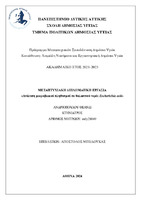| dc.contributor.advisor | Beloukas, Apostolos | |
| dc.contributor.author | Ανδριοπούλου, Θεανώ | |
| dc.date.accessioned | 2024-10-16T05:42:58Z | |
| dc.date.available | 2024-10-16T05:42:58Z | |
| dc.date.issued | 2024-09-30 | |
| dc.identifier.uri | https://polynoe.lib.uniwa.gr/xmlui/handle/11400/7745 | |
| dc.identifier.uri | http://dx.doi.org/10.26265/polynoe-7577 | |
| dc.description.abstract | Η θάλασσα είναι συνυφασμένη με τη ζωή του ανθρώπου, αφού αποτελεί για αυτόν μέρος αναψυχής και φιλοξενεί πολυάριθμα ζωικά είδη, εκ των οποίων ορισμένα καταναλώνονται από αυτόν. Ωστόσο η θάλασσα εγκυμονεί αρκετούς κινδύνους, καθώς αποτελεί δεξαμενή ευκαιριακά παθογόνων μικροοργανισμών που μπορεί να οδηγήσουν στην ανάπτυξη λοιμώξεων. Ένα άλλο ζήτημα που έχει προκύψει είναι η ύπαρξη ανθεκτικών στα αντιβιοτικά μικροοργανισμών στο θαλάσσιο οικοσύστημα. Αυτό το φαινόμενο οφείλεται στην αλόγιστη χρήση των αντιβιοτικών σε ποικίλους τομείς, υπολείμματα των οποίων μέσω διάφορων οδών, όπως υδάτινων απορροών, λυμάτων και λοιπών ανθρωπογενών δραστηριοτήτων καταλήγουν σε υδάτινα σώματα συμπεριλαμβανομένων των θαλασσών. Η παρούσα ερευνητική διπλωματική εργασία εξέτασε την παρουσία του βακτηρίου Escherichia coli (E. coli), το οποίο είναι καθιερωμένος δείκτης κοπρανώδους μόλυνσης, σε δείγματα θαλασσινού νερού. Ακόμα μελέτησε την αντιμικροβιακή αντοχή και τις φυλογενετικές ομάδες των απομονωθέντων στελεχών. Η έρευνα πραγματοποιήθηκε σε πολυπληθή κολυμβητικής ακτή του Πειραιά κατά τη διάρκεια δύο δειγματοληψιών της κολυμβητικής περιόδου, τον Μάιο και τον Ιούλιο του 2023. Βάσει των αποτελεσμάτων η συγκεκριμένη κολυμβητική ακτή δεν συνίσταται για κολύμβηση, καθώς σε κάθε δειγματοληψία καταμετρήθηκαν >500cfu/100ml. Συνολικά, απομονώθηκαν 107 στελέχη (66 από την πρώτη και 41 από τη δεύτερη δειγματοληψία), εκ των οποίων τα 87 ταυτοποιήθηκαν ως E. coli και μελετήθηκαν περαιτέρω. Η ανάλυση της αντιμικροβιακής αντοχής έδειξε ότι τα περισσότερα στελέχη ήταν ευαίσθητα σε όλα τα υπό μελέτη αντιβιοτικά (53%, 46/87). Επίσης αρκετά συχνή ήταν η ανίχνευση ανθεκτικών στελεχών (47%, 41/87) αλλά κανένα δεν εμφάνισε πολυανθεκτικότητα. Επιπλέον, σύμφωνα με τα αποτελέσματα της φυλογενετικής τυποποίησης, η πλειοψηφία των στελεχών κατατάχθηκε στην ομάδα Β2 (34%, 30/87) και ακολούθησαν οι ομάδες Β1 (31%, 27/87), Α (29%, 25/87) και D (6%, 5/87). Ακόμα, η ομάδα Β2 ήταν η πιο συχνή μεταξύ των ανθεκτικών πληθυσμών ενώ η Β1 μεταξύ των ευαίσθητων. Παρά το γεγονός ότι το πλήθος των ανθεκτικών στελεχών που ανευρέθηκαν ήταν μικρός αριθμός, τα ευρήματα υπογραμμίζουν την ανάγκη για συνεχή παρακολούθηση της ποιότητας του θαλασσινού νερού και της αντιμικροβιακής αντοχής σε αυτά τα ενδιαιτήματα, καθώς και την ανάπτυξη στρατηγικών για τον περιορισμό της διασποράς ανθεκτικών βακτηρίων. | el |
| dc.format.extent | 73 | el |
| dc.language.iso | el | el |
| dc.publisher | Πανεπιστήμιο Δυτικής Αττικής | el |
| dc.rights | Αναφορά Δημιουργού - Μη Εμπορική Χρήση - Παρόμοια Διανομή 4.0 Διεθνές | * |
| dc.rights | Attribution-NonCommercial-NoDerivatives 4.0 Διεθνές | * |
| dc.rights.uri | http://creativecommons.org/licenses/by-nc-nd/4.0/ | * |
| dc.subject | Escherichia coli | el |
| dc.subject | Θαλασσινό νερό | el |
| dc.subject | Αντιμικροβιακή αντοχή | el |
| dc.subject | Δημόσια υγεία | el |
| dc.subject | Seawater | el |
| dc.subject | Antimicrobial resistance | el |
| dc.subject | Public health | el |
| dc.title | Ανάλυση μικροβιακού πληθυσμού σε θαλασσινό νερό: Escherichia coli | el |
| dc.title.alternative | Microbiome in sea water samples: Escherichia coli | el |
| dc.type | Μεταπτυχιακή διπλωματική εργασία | el |
| dc.contributor.committee | Γιακκούπη, Παναγιώτα | |
| dc.contributor.committee | Tzanakaki, Georgina | |
| dc.contributor.faculty | Σχολή Δημόσιας Υγείας | el |
| dc.contributor.department | Τμήμα Πολιτικών Δημόσιας Υγείας | el |
| dc.contributor.master | Δημόσιας Υγείας | el |
| dc.description.abstracttranslated | The sea is deeply intertwined with the human life, serving as a source of recreation and hosting numerous animal species, some of which are consumed by humans. However, the sea also poses significant risks, as it acts as a reservoir for opportunistic pathogenic microorganisms that can lead to infections. Another emerging concern is the presence of antibiotic-resistant microorganisms within the marine ecosystem. This phenomenon is largely attributed to the indiscriminate use of antibiotics across various sectors, with residues entering the aquatic bodies, including the sea, through different pathways such as water runoff, sewage, and other human activities. This research thesis investigated the presence of the bacterium Escherichia coli (E. coli), a well-established indicator of fecal contamination, in seawater samples. It also studied the antimicrobial resistance and phylogenetic groups of the isolated strains. The research was conducted on a populous swimming beach in Piraeus during two sampling timepoints in the swimming season, May and July 2023. Based on the results, the specific beach is not recommended for swimming, as each sample exceeded 500 cfu/100ml. A total of 107 strains were isolated (66 from the first sampling and 41 from the second), of which 87 were identified as E. coli and further analyzed. The antimicrobial resistance analysis revealed that most strains were sensitive to all tested antibiotics (53%, 46/87). Additionally, a considerable proportion of resistant strains (47%, 41/87) was detected, although none exhibited multi-drug resistance. Furthermore, according to the results of the phylogenetic typing, the majority of strains were classified in group B2 (34%, 30/87), followed by groups B1 (31%, 27/87), A (29%, 25/87), and D (6%, 5/87). Notably, group B2 was the most frequent among the resistant populations, while B1 was predominant among the sensitive ones. Despite the relatively small number of resistant strains found, the findings underline the need for continuous monitoring of the seawater quality and antimicrobial resistance in these environments, as well as the development of strategies to limit the spread of resistant bacteria. | el |


